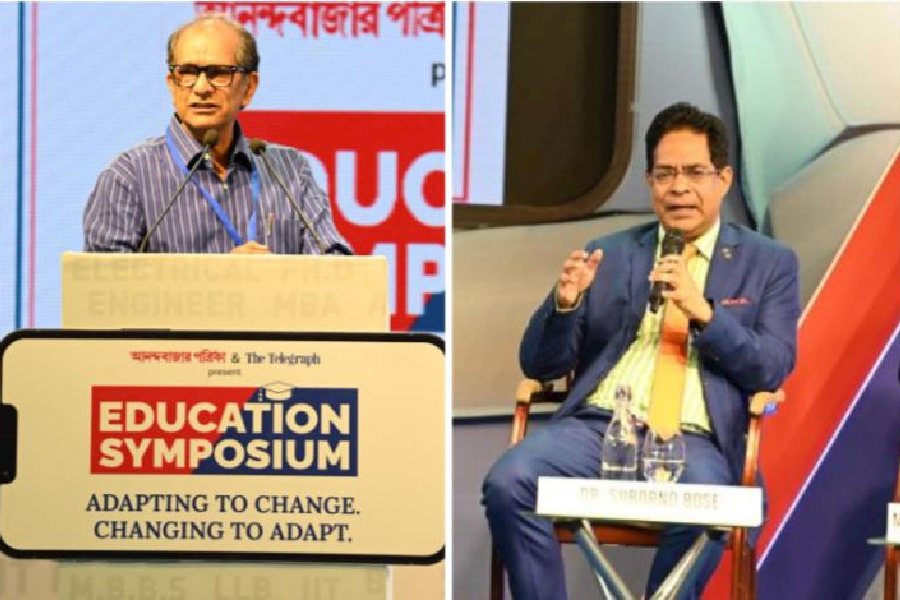The fundamental aim of higher education should not only be to produce students who get good jobs but to create “inclusive critical citizens”, said Suranjan Das, former vice-chancellor of Jadavpur University, who now helms Adamas University.
Das was a panellist at a discussion titled "Online, Blended, ChatGPT: Will the Dynamics of Education in India Change".
“The fundamental aim of higher education should not be only to produce students who can get a good job once they complete their courses. Of course, we should try to do that, but that is not what our forerunners, whether in India or abroad, had thought as the goal of higher education,” said Das.
The panel discussion, held on July 31, was part of Anandabazar Patrika & The Telegraph present Education Symposium. The topic: "Adapting to Change. Changing to Adapt".
Das said that one has to adapt to change and change to adapt but this “paradigm shift should be something which should not deprive the fundamental aim of higher education to create inclusive critical citizens”.
The observations made in another panel discussion at the programme provided the context to Das’s statements. The other panel discussed how education should be oriented in a way that it caters to industrial needs.
Das asked his audience to think of what a historian, a political scientist or a litterateur could write about what the industry needs.
There has to be industry-university partnerships but that should not mean that all disciplines have to be subjected to industrial needs, said Das.
Das said one could not become a slave to ChatGPT and should know how to combat the challenges it poses.
“What we need to do is combat the challenges of ChatGPT, which I think is a constructive challenge. We have to go in for a fundamental pedagogic revolution. A pedagogic revolution that would make the students think critically... a pedagogic revolution which would make students think in cooperative terms,” he said.
Experts from diverse fields of education expressed their opinion on the topic during the 55-minute discussion.
Listing the benefits of AI, Suborno Bose, chief mentor of the International Institute of Hotel Management, said that in a class of 50, students could be given individual attention through AI (artificial intelligence).
“AI can find the individual strengths and weaknesses of students and mentor them as per their individual capabilities,” said Bose.
The assessment can also be “tailor-made” — in a class of 50 there will be 50 different assessments based on the capabilities of students.
“The problem with our education is we don’t give feedback to the students. We just inform them you got 90 per cent, you got 10 per cent, you failed, you passed... now go and fend for yourself. Here, AI can give you individual feedback on where you went wrong, where you did well and where you can do better,” said Bose.
He said that it has given us flexibility where one can work from anywhere in the world.
“You don’t need to come to the office as long as the work is done,” said Bose.
“In a country like India which has great opportunities with so many students, employability is also important. Education is always to be linked with employment and that is relevant in today’s world,” said Bose.
“When we connect education with the future of business, we are connecting education with the future of employability and, without AI, blended learning, this cannot be achieved.”
Sharing the panel with Das and Bose were Satyam Roychowdhury, founder managing director, Techno India Group and chancellor, Sister Nivedita University; and Sanjay S. Pawar, principal, Dr BC Roy Engineering College.
Roychowdhury said: “We have to take the good of it... there has to be a guardrail. Teachers should define how much a student would be using ChatGPT and not beyond. That would be helpful for our academic standards.”
Amitava Dutta, pro-vice-chancellor, Jadavpur University, was the guest speaker on the panel.
